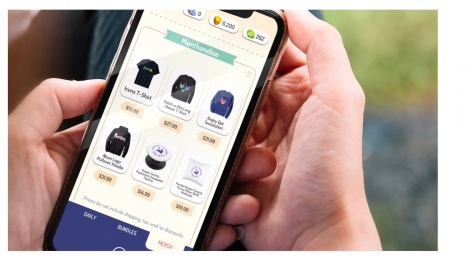Finding new ways to monetise your game in the current, tough mobile market grows increasingly crucial to the its long term prospects. No matter how good the title itself is, opening it up to new audiences with cross platform gaming or releasing on alternate app stores only increase the chance of success.
But what about not monetising your title in-game? Amazon Anywhere allows game and app developers to add in-game shopping where a player is taken directly to the Amazon Anywhere storefront to purchase physical items without needing to leave the game.
As we see more big name IPs making it onto mobile, this could prove to be a beneficial way to tie in physical merchandise purchases.
In this guest post, Layer’s CEO, Rachit Moti, explains how Niantic’s AR pet game Peridot may be the first to utilise Amazon Anywhere, but it likely won’t be the last.

When Niantic released its AR virtual pet game, Peridot, in May, no one expected it to include an in-game shopping experience where players could purchase Peridot-themed merchandise and physical items without leaving the game. But that’s exactly what players got through the game’s integration with Amazon’s ‘Amazon Anywhere’ storefront.
Amazon Anywhere provides Peridot players full access to curated products and Peridot merchandise on Amazon – all you need to do is link your Amazon account to your player account in the game. Orders ship like they would from Amazon and can still be tracked and managed through the Amazon app. While Peridot is the first mobile game to support Amazon Anywhere, it probably won’t be long until the storefront pops up in other mobile games and apps.
But is this new immersive shopping experience something that only Amazon will benefit from? Or is there an exciting opportunity for mobile game studios, app developers and publishers to drive revenue and build customer engagement?
A natural evolution for in-game purchases
As most mobile games are free-to-play, players have grown accustomed to making in-game purchases of digital content such as cosmetic items, in-game currency, battle passes and more. Amazon Anywhere switches things up by introducing physical items to the world of IAPs. With the exception of raffle tickets with physical awards being given away in some Japanese mobile games such as Cookie Run Kingdom, the incorporation of physical items into a gaming environment marks new ground for mobile games.
Given that most mobile games already rely on IAPs to generate revenue, adding a new sales channel for physical items could create more opportunities for monetisation.
That said, the big question that remains is how profitable this new channel will be. Amazon hasn’t revealed how much commission it will take on sales generated through Amazon Anywhere. Amazon currently charges a referral fee between 8–15%, with shipping costs determined by whether orders are fulfilled direct or through Amazon. For those game companies who already have products listed on Amazon, it’s unclear if Amazon Anywhere integration will add an additional cost on top of what they’re already paying for listings on the Amazon website.
Video game merchandising levels up

The growing popularity of video game IP means there’s an increasing demand for video game physical merchandise. On Amazon, you can find thousands of products based on gaming IP, such as Resident Evil, Fortnite, PUBG, League of Legends, Call of Duty, Crash Bandicoot and many more.
In fact, there’s so much video game merchandise on Amazon that it can often be hard to find what you’re looking for, especially with so many sellers paying to promote their merchandise, which can lead to irrelevant products popping up at the top of your search results.
This is where Amazon Anywhere could benefit game studios the most. With so much video game merchandise on Amazon, studios that have physical products can use Amazon Anywhere to curate their own selection of products that players can purchase directly through the app.
Not only does this provide game studios with an opportunity to showcase their products to potentially millions of customers, but it eliminates the risk of customers purchasing an unofficial product based on their IP if they’re promoted in the Amazon web browser.
An easier way into physical merchandise
Of course, there are plenty of notable mobile game studios that don’t have a presence on Amazon. That might be for several reasons, from already having merchandising and licensing agreements in place with third parties, not having the internal resources to manage the fulfilment of physical merchandise, or even viewing the Amazon marketplace as being too competitive to convert customers.
But for video games that already have millions of players, there’s an opportunity here to grow sales for physical products. Yes, this will require resources to manage, but if you let Amazon take care of fulfilment and focus on creating physical products with a high-profit margin, this could open up viable monetisation channels.
Not only that, but physical merchandising is also a great way to build marketing and awareness of your mobile game, ensuring you have a presence in the physical world rather than just digital.
A new opportunity for mobile games and apps?
The mobile gaming industry is well-known for its innovation when it comes to monetization. While this is still early days for Amazon Anywhere, it will be interesting to see which game studios choose to integrate this new storefront into their titles, and whether the demand from players will make the integration worthwhile.
Edited by Paige Cook





















